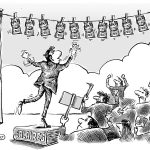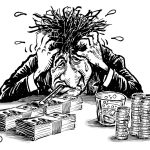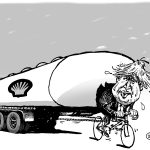United States:the economy as the ultimate referee
The battle for the presidential election will focus on the results and the economic promises of the candidates. What can investors expect from them?
The first televised debate turned out to a bare fistfight, which did not quell the fears about the smooth running of the election, not to the presidential contamination… Less than a month before the election, the twists follow one another and tension rises between the two camps, leaving an impression of confusion and disintegration of American politics, and institutions, which could well end up destabilizing the markets.
Many people consider that this time “it’s the pandemic stupid!”. The least that can be said is that the management of the pandemic does not plead in favor of the outgoing President, now infected, both by the number of victims among his fellow citizens and by his multiple statements of denial and promises of speedy remedies and vaccines. From his hospital bed, Donald Trump could see Joe Biden’s lead widening in the polls.
Will the economy be absent from this campaign? It would be surprising! And if so, what will voters remember? The years of growth, the current shock, the promises to come? Donald Trump has growth and jobs on his side. It was under his presidency that America turned the page on the 2008 crisis, and that corporate morale – especially small and medium-sized ones – (again) skyrocketed and the stock market soared. By the end of 2019, the unemployment rate had fallen to an all-time high of 3.5%. After the violent shock of last spring, employment is rebounding massively.
But at what cost, and thanks to whom? Some would say that this performance is the result of the efforts of the previous presidency, and that it owes everything to the monetary policy carried out by the Federal Reserve. Jerome Powell, in his Jackson Hole speech, did he not himself promise to steer monetary policy more directly toward employment protection? It should also be noticed that in recent years, the participation rate of individuals has always remained lower than it was in the early 2010s.
The decline in domestic savings combined with rising deficits deficits only worsen the external balance.
The outgoing President also leaves a significant “slate”: it was in 2019 that the budget deficit exceeded 1 trillion dollars1, so 4.6% of GDP. The cost of debt had risen sharply, while corporate tax revenues, the lowest since 2009, were below the 50-year average. The current crisis threatens to propel the public deficit to almost 16% of GDP, and the public debt to more than 130% this same year2.
What about the trade war? The bilateral deficit between China and the United States has been reduced somewhat. However, negotiations are at a standstill, Chinese concessions minimal and animosity general mistrust. With the pandemic, the country’s current account is deteriorating again. Besides the fact that inward trade flows may have taken other roads, falling domestic savings combined with rising deficits only worsen the external balance. It is the return of “twin deficits” and the fear that the status of the dollar will deteriorate3.
For his part, Joe Biden is championing the legacy of the Obama years, as protector of the Affordable Care Act (Obamacare), which is now a consensus in the country. A candidate for appeasement, he finds himself caught in the crossfire. Too timid for the left wing of his party, he will always be too threatening to Wall Street. He promises a massive economic recovery plan, but will he go as far as implementing the major infrastructure project that everyone is calling for? Will it push for greater social coverage? And with what money? If elected, he will find himself in such a poor financial economic situation that his supporters fear he will become the President of austerity. In any case, he will have to take from the pockets of the richest. As we have seen, the potential for increasing taxation is on the side of “Corporate America”. Candidate Trump’s accusations will have a real resonance in this field, no doubt. Facing the outgoing President, Joe Biden is also more liberal and friendly in terms of trade, but isn’t the majority of the country now protectionist? Convincing his electorate that he can make a difference without scaring away the undecided will not be so easy.
The exceptional context of the election suggests that it will not just be about the economy.
But it will not skirted either.
1 See our editorial of November 5, 2019, “Thousand billion dollars”
2 The US fiscal year ends September 30
3 See our editorial of February 11, «The dollar pain »
Published in French in allnews.ch on Monday Oct 5th, Cartoon © Barret



